
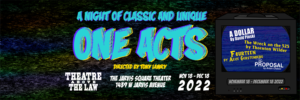 [rating=3]Theatre Above the Law’s production of “A Night of Classic and Unique One Acts” was never dull but seemed overacted and overdone. The four one-act plays are made up of “A Dollar”
[rating=3]Theatre Above the Law’s production of “A Night of Classic and Unique One Acts” was never dull but seemed overacted and overdone. The four one-act plays are made up of “A Dollar”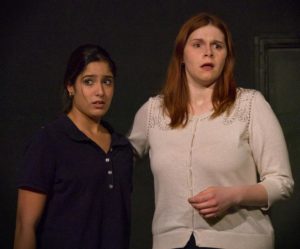 by David Pinski, “The Wreck on the 525” by Thornton Wilder, “Fourteen” by Alice Gerstenberg, and “The Proposal” by Anton Chekhov. The stories are very different from each other and are not of equal caliber. If you’re into watching highly dramatized and exaggerated performances, then this is a must see for you. If you’re not into seeing actors doing lots of emoting and shouting, then I would not recommend this show.
by David Pinski, “The Wreck on the 525” by Thornton Wilder, “Fourteen” by Alice Gerstenberg, and “The Proposal” by Anton Chekhov. The stories are very different from each other and are not of equal caliber. If you’re into watching highly dramatized and exaggerated performances, then this is a must see for you. If you’re not into seeing actors doing lots of emoting and shouting, then I would not recommend this show.
Bafflement is the best word to describe watching “A Dollar.” What was it that the playwright trying to prove? Was it that the characters are friendly enough with each other until they decide tofight over a one-dollar bill? Is this show supposed to point up the corruption that takes place when people come to fisticuffs over the Almighty Dollar? Is the purpose of this play to reflect on the materialism in our society? The problem is that all of the characters are much too shallow, and we as an audience don’t care about them. Nor do we care when a stranger shows up and eventually takes the dollar bill away. Actors in this segment include: Andrew Cawley, Ross Compton, Nick Barnes, Haley Peters, Abby Gilster, and Jamie Redwood.
“The Wreck on the 525” is lackluster in a different way. The setting is a home in Boston, where Mrs. Hawkins (Abby Gilster) and her daughter Minnie (Lena Valenti) wait for Mr. Hawkins (Nick Barnes) to come home for the evening. We understand that Mr. Hawkins is going through some sort of existential crisis when he decides to take a different train home from work than what he’d normally be on. We soon understand from their neighbor Mrs. Forbes (Jamie Redwood) that Mr. Hawkins’ life has radically changed (for the better or worse) when he unexpectedly receives a huge inheritance from some elderly woman. Now as he stands on his lawn looking over at his house, he reevaluates his life’s meaning and direction. Has the addition of this great sum of money make things seem so terrible or unstable that he is suddenly interested in the unlicensed gun that he is carrying on his person? (Hint: For those among you who studied sociology in college, think of Emile Durkheim’s study of suicide, but I digress.) Since I have not read Wilder’s original play, I’m not sure whether the issue in telling this tale lies with the original text or with its presentation on stage. But what I can say is that the intrigue set forth by the characters never builds up to the fevered pitch that I was anticipating.
“Fourteen” is a farce that is quite easy to follow and has to do with the culture of manners. The British socialite Mrs. Pringle (Jamie Redwood) wants to host a fashionable dinner party that is presumably taking place around the late 1960s/early 1970s. She is in a dither because the number of guests is supposed to be fourteen, but, due to various comedic circumstances, the number of respondents keeps shifting. All sorts of people accept her invitation or express their regrets over the telephone and this number constantly shifts. Mrs. Pringle doesn’t want the unlucky number of thirteen, and the number twelve, for some reason, doesn’t work regarding the proper seating of Mrs. Pringle’s husband. On top of it all, she wants to introduce her daughter Elaine (Lena Valenti) into high society and has created this dinner party in the first place so she can make a good match for her daughter. Dunham (Haley Peters), the faithful servant, continually plays interference between Mrs. Pringle and the unseen cook in the kitchen as the number of guests keeping changing. This show is amusing but, to my mind, it goes overboard with hysterics. (Maybe British farces are not my “cup of tea.”)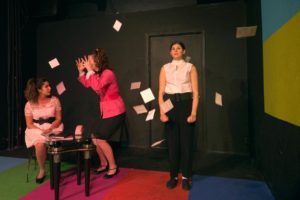
“The Proposal” is meant to be funny also. This play, set in Russia, uses a lot of asides to explain to the audience how each of the characters feel, given the crazy yet plausible situation that they are all placed in. Ross Compton (Stepan Stepanovitch Chubukov), Haley Peters (Natalya Stepanovna), and Andrew Cawley (Ivan Vassilevitch Lomov) each do a respectable job channeling Chekhov’s classic characters but minus the Russian accents. Basically, Lomov and the Stepanovitch family live on neighboring parcels of land. Lomov has finally summoned enough courage to ask for Natalya’s hand in marriage, but this circumstance becomes a fiasco when previous disputes between their two families suddenly bubble to the surface. What is meant to be a happy day becomes a huge squabble among the three of them, and their constant bickering soon becomes rather predictable, given the cultural background that they come from. Despite some interesting twists and turns in the story, the physical comedy becomes excessive, and here I blame the original text, not the actors. Then again, maybe it was just too overplayed to the point where I didn’t find it funny anymore.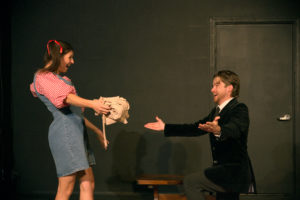
The multi-use set of colored squares on the floor and walls plus a black background makes it quick and easy to change from one story to the next on such a small stage, thanks to Stina Taylor’s set design. What this means is that the audience needs to imagine the setting for each of the four acts. While “A Dollar” takes place outdoors, the rest take place inside, and the few props that are used to create the various scenes are judiciously recycled among the stories. Again, the audience needs to imagine the missing furniture and bric-a-brac, although there are moments when a few more props would have been useful. (And I do think that the princess telephone should have had a squiggle cord on it.)
The best part of the entire production is Emma Olson’s sound design, having to do with inclusion of television show theme songs, music, and radio commercials circa 1960s and 1970s. If anything, this theme minimally ties the four separate acts together into a somewhat amusing 95-minute show. Just so you know, Theatre Above the Law mentors young performers at their Rogers Park storefront, and thus has a very noble mission. Opening night on a cold winter’s evening was at a time when both the actors and the audience are starved for live theatre and for gathering with our fellow human beings—after living through such a long pandemic.
“A Night of Classic and Unique One Acts”, directed by Tony Lawry, is playing at the Jarvis Square Theater, 1439 W. Jarvis Avenue, in Chicago, through December 22, 2022
Tickets range from $15-$25 and can be purchased at https://www,theatreatl.org/.
Due to the small size of the venue (30 seats), ticket availability is limited.
Performance schedule:
 Fridays and Saturdays – 8:00 p.m.
Fridays and Saturdays – 8:00 p.m.
Sundays – 3:00 p.m.
No shows on Thanksgiving weekend!
Additional performance:
Monday, December 5 – 7:30 p.m.
COVID requirements are still in effect. You will be asked to present your vaccination card and you will be required to wear a mask covering your nose and mouth while in the building and while attending the performance.
To see what others are saying, visit www.theatreinchicago.com, go to Review Round-Up and click at
“A Night of Classic and Unique One Acts”.


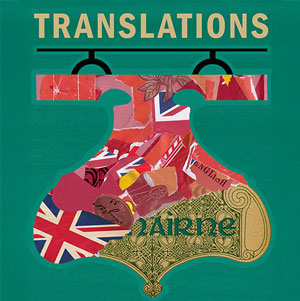



More Stories
“Translations”
“The Firebugs” reviewed by Julia W. Rath
“The Book of Grace” Al Bresloff with another from Paul LIsnek